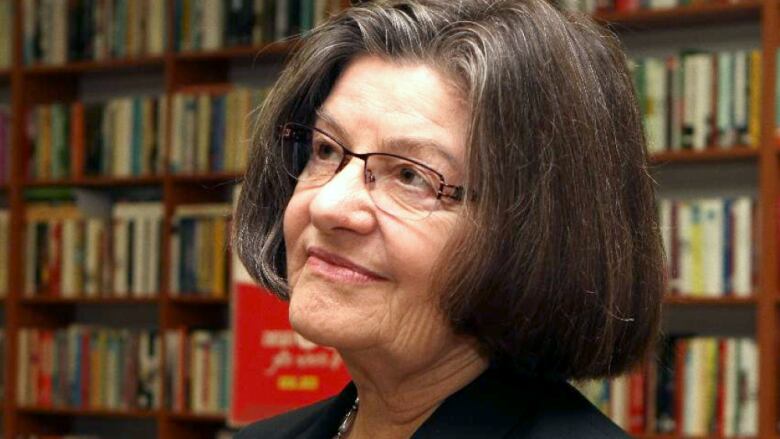How Sharon Butala became a writer

With 18acclaimed books under her belt including her recent memoir Where I Live Nowand herlyrical and moving historical novel Wild Rose Sharon Butala has more than a few pearls of wisdom about where to look (and where not to look) for inspiration.Where I Live Nowis a finalist for the Governor General's Literary Award for nonfiction.
Below, Butala answers eight questions submitted by eight of her fellow writers in the CBC Books Magic 8 Q&A.
1. George Bowering asks, "Do you choose what to read (other than research) while you are writing a book, or do you just keep on reading what you read?"
While I'm writing a book I'm very careful what I read. If fiction, I have to avoid certain voices depending on what I'm writing, and if nonfiction the same. Or else I read nonfiction while writing fiction and fiction when I'm writing nonfiction. You can't let the wrong voices into your head, yet when I can't myself find the right voice, I read poetry and there it is again, I can remember what my work should sound like. (Although "sound" and "voice" aren't spoken.)
2. Drew Hayden Taylor asks, "How do you decide on character names?"
I own two different books of baby names and I search, mix, match and alter the names I find in the book. Or while watching TV, I write down names I like in the credits and I alter them to suit my character. I do the same with the phone book. (I've kept an old one.)
3. Rudy Wiebe asks, "Who helped you most in becoming a writer? How?"
It's hard to specify who helped me most when I was learning to write, but Caroline Heath was so very helpful and patient at the beginning in the late '70s and early '80s, and eventually (and to this day) Phyllis Bruce. This is help well beyond merely editing. It is also emotional support and willingness to listen to ideas. So I have to add my current agent, Jackie Kaiser at WCA. I haven't lived much within the whole literary milieu, being so isolated on the ranch, or I know I would be naming other writers too.
4. Lorna Crozier asks, "If you could come back as a musician, what area of music would you choose, and are you secretly a songwriter, and if so, what is your song about?"
I'd come back as a piano player and I'd play blues. But I'd rather come back as a k.d. lang kind of singer (or Bonnie Raitt) and I would want to sing about the pain and the beauty of life and how they are inseparable. Or if I wrote songs, I'd write songs like John Prine's accessible, slightly weird, quirky and fun.
5. Karen Solie asks, "Do you need, do you want, or do you have your own room to work in?"
I'm a widow; I have a whole condo to write in. In the early days on the hay farm I took over a bedroom with a door (no lock) and its own window overlooking the old log house next door and the lilac bushes. My walls were covered with full bookshelves and my desk was an old kitchen table some settler had made with a formica table top. It was paradise. I think having your place where you write is important; it is as if the writing spirits settle there to wait for you and help you. You settle in among them each time you sit down to write.
6. Patrick deWitt asks, "What is the least useful writing advice you ever received?"
Probably that piece that years ago V.S. Naipaul wrote where he lists rules for writing. I can't quote them, but they were something like, no sentence should contain more than twelve words, and nonsense of that sort. I sometimes use the list in writing classes because in week one of writing they aren't such a bad idea but otherwise get lost, Naipaul. You don't follow your own rules, and you'd be a terrible writer if you did.
7. Marina Endicott asks, "Can you love a book written by a lousy human being?"
Oh, the age old question! I'm no wiser on this one than anybody else. I'm a great admirer of the novels of the Norwegian Nobelist Knut Hamsun and he was, apparently, a Nazi sympathizer and even went to meet Hitler. Norway fined him for this, taking all his Nobel money from him so that he died in poverty. Yet his novels move me deeply. I suppose it's a case of paying to Caesar that which is Caesar's and to God, that which is God's. In other words, you separate them. What I can't understand is how a bad human being can create brilliant, good art. It puzzles me greatly and it worries me. But I'm not at all sure that Hamsun (he used a pseudonym) was a bad human being. Who am I to judge? How can you profoundly understand the suffering of the poor and yet support fascism? Is there a clue here?
8. Kim Thy asks, "If you had to choose, would you prefer one extremely successful book or many much smaller successes?"
One very successful book is a dream come true, but if it means all my other work would be ignored or dismissed, no thanks. Writing is after all about writing, about being an artist, not about climbing to the top of the heap - although these days it feels that that might be all it's about, and so I guess I think, I hope I would choose to write a lot of interesting, admired books that gave me joy to write.












_(720p).jpg)


 OFFICIAL HD MUSIC VIDEO.jpg)
.jpg)



























































































